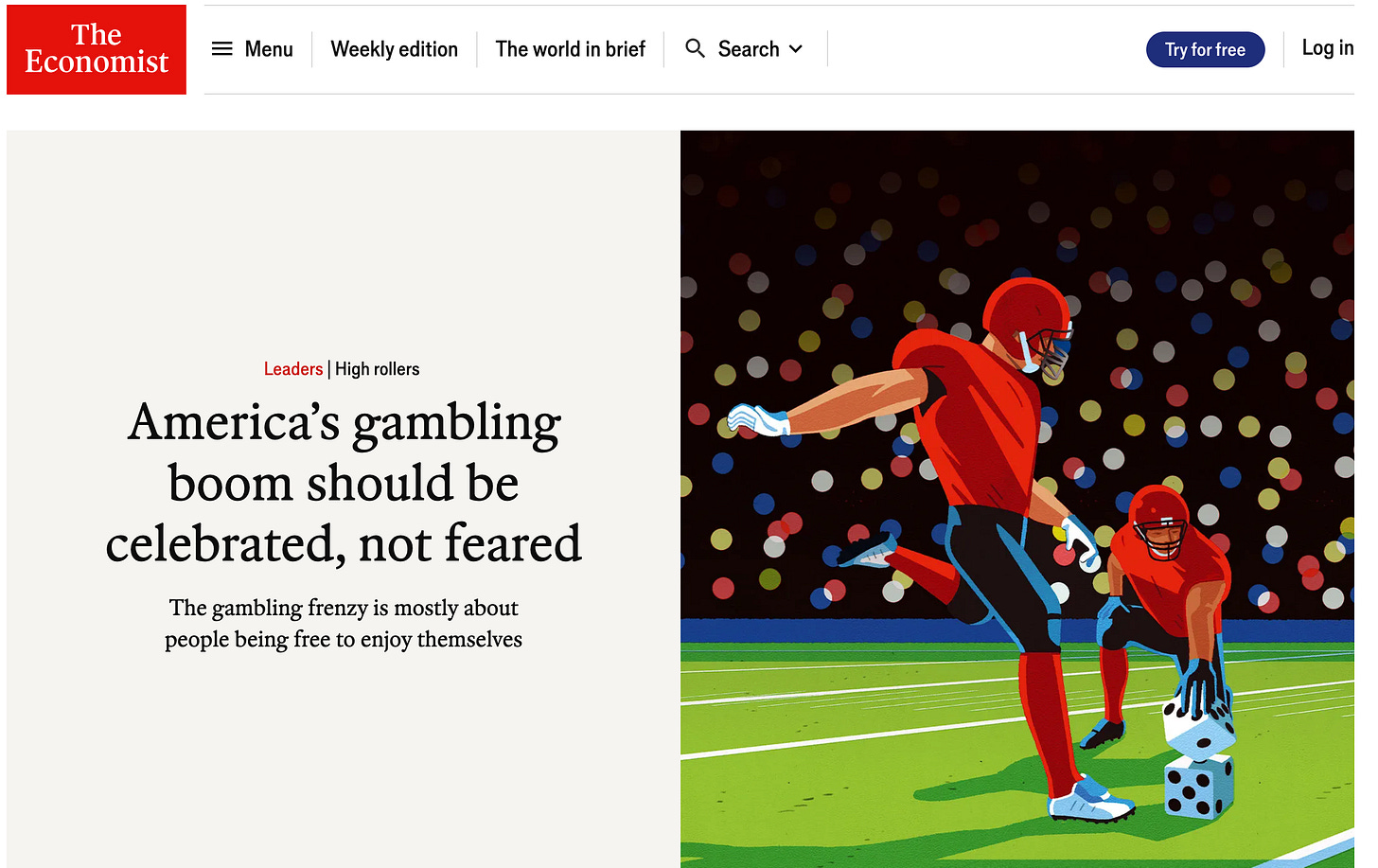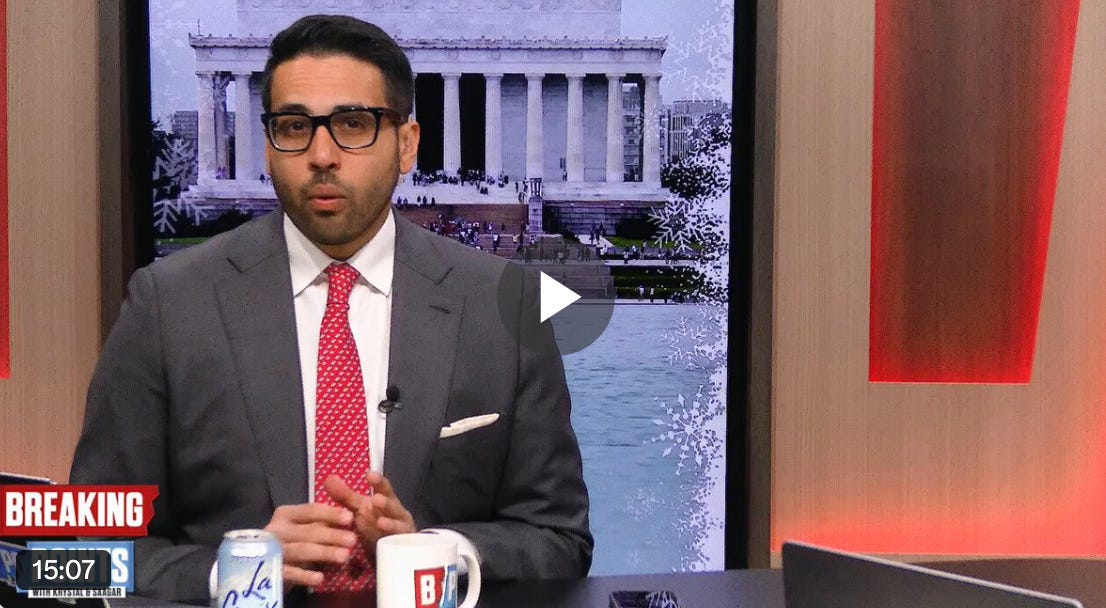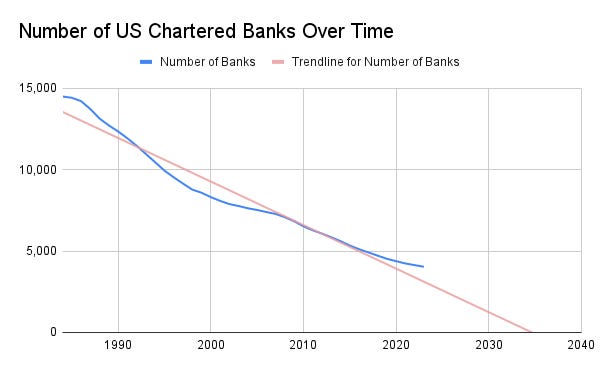The Fall of Romance
Romantic troubles, the problems with sports betting, why conservatives can't win the culture war and more in this week's roundup
I’m very honored that World magazine has named my book Life in the Negative World: Confronting Challenges in an Anti-Christian Culture as its 2024 book of the year (Christian non-fiction). I can now officially describe it as as award winning book. If you haven’t read it yet, be sure to pick up a copy.
The Economist on Sports Betting
The Economist magazine leans into sports betting.
This reminds me of the WEF’s infamous “You’ll own nothing, and you’ll be happy ad.” When I posted that observation on X somebody noted that sports betting is how you end up owning nothing!
Podcast host Saagar Enjeti has been great on showing the downsides of sports betting. He published a new monologue about it that has a lot of great information in.
Saagar is not religious so far as I know, so it’s interesting to see the way he opposes this. He also tries to propose a framework that, although unlikely to be implemented, is at least politically and publicly feasible in a way that simply banning gambling is not.
The famed urbanist Jane Jacobs disliked cars but realized the couldn’t simply be banned. So she called for a policy of “attriting” the use of the automobile incrementally reducing its use in cities. That’s probably the best approach to dialing back some of the worst gambling abuses.
Related from the Independent (UK): DraftKings sued after father-of-two gambles away $1 million of his family’s money
The Fall of Romance
The Atlantic ran an interesting piece on the slow, quiet demise of American romance:
But even if these women don’t prioritize dating a man with a degree or a prestigious job, many of the men without those credentials don’t want to date them. In the U.S. and elsewhere, Marcia C. Inhorn, a Yale anthropologist, told me, mainstream cultural tradition has encouraged women to engage in hypergamy: “marrying up to a slightly older man, somebody who’s more career advanced, makes more money.” Men, meanwhile, have tended toward hypogamy, marrying someone younger, less well off, and less academically accomplished. Those norms are still so ingrained that as more women have made advances at school and work, many men have held it against them. That women’s hard-earned achievements disadvantage them romantically is a dark irony.
She tries to portray that frozen dating market as a result of male as well as female preferences, but I think it’s pretty clear that women are more insistent on marrying someone at or above their level in income and education than men are about marrying someone below their level. Also, I think in America today there’s just a big cultural gap between the top 20% professional class and everyone else that makes it legitimately hard to connect across that boundary.
Women, for instance, are freezing their eggs at growing rates. Many commentators have assumed that the trend is the result of women prioritizing their careers, but Inhorn has found that the large majority would have children sooner rather than later if they could; they’re simply struggling to find a co-parent.
Interesting that she doesn’t talk about these women finding a husband, but a “co-parent.” Maybe this conception of relationships is part of the problem.
The Times of London ran an interesting essay by a woman describing what she’s never admitted about dating apps.
According to Ofcom’s annual Online Nation review, Tinder has lost 600,000 users, Hinge 131,000, Bumble 368,000, and Grindr 11,000, all in the UK. Going by the successes of my friends, I’d estimate that about 20 of those 1.1 million users deleted the app because they’d found someone on it. The rest have just given up on the apps altogether and are hoping to find a colleague to snog at the office Christmas party instead.
…
I can’t begin to count the number of hours that I’ve spent swiping through the endless carousel over the past decade. If I’d spent as many propping up a bar, surely I’d have met at least a few men there. The apps aren’t a solution, just a placeholder, a way to feel like we’re being proactive.
One of my best girlfriends has played the numbers game for years, routinely going on dates and introducing a few of the longer-standing matches to us at dinner parties. But, after years on the apps, her new boyfriend is a friend of her brother’s.
On the topic of romance, someone sent me this 2022 Toyota Corolla ad that somewhat tongue in cheek argues that being boring and dependable is sexy.
As the person who sent this to me pointed out, this is what the evangelical church often teaches as serious advice.
It’s wrong, of course. It’s worth noting regarding both these ads and the pieces above that dating and marriage today aren’t economic transactions and can’t be negotiated. There has to be genuine attraction, sparkle, fire.
Why Conservatives Can’t Win the Culture War
Janan Ganesh of the Financial Times is a great columnist. He wrote a recent piece arguing that the reason conservatives can’t win the culture war is that they care too much about making money:
The controversies of the day expose a problem with the right and it isn’t corruption. It isn’t “sleaze”. It is the impossibility of chasing money and fighting the culture wars. [Multimillionaire Nadhim] Zahawi is one person, but stands for millions of a conservative temper in each generation. They are entitled to choose lucrative work over a life in the institutions that set the cultural weather. They are entitled to deplore the success of the left in bending those institutions to their dogma. What is neither honest nor becoming is to do both: to forfeit terrain and then seethe at its capture by hostile elements.
…
To put it another way, while the culture war will modulate in intensity, the basic shape of it will never change. Barring the introduction of universal conscription into arts organisations, academic faculties, publishing houses, official bureaucracies, quangos and public broadcasters, these entities will more often than not tilt left. Such is the aggregation of individual choices like Zahawi’s. Or, indeed, Rishi Sunak’s to go into finance. Or Jeremy Hunt’s to set up a business after graduating. If I were being cheeky, I’d call it the invisible hand of the market.
…
Imagine, if you can bear it, the life of the average stand-up comedian. You traipse from pub to club for a small fee and expenses. “Success” is the occasional slot on a television panel show. You start a deeply unremunerative podcast. You self-publish a novel and lose money on it. No one who is financially motivated would enter this world. Those who prioritise other things, such as creative expression or public exposure, might. And that — not the innate unfunniness of conservatives, not a liberal plot against them — is why comedy is a near-monopoly of the left. The right is usually the first to say that a state of affairs can be “unequal” without being “unfair”. It struggles to do so in this instance.
Click over to read the whole thing.
There’s more to it than this, obviously. But there isn’t less. Conservatives do face real barriers to entering prestigious culture shaping professions and positions, but very often top conservative talent doesn’t even want to.
I’ll give myself some credit here. I left a position as a managing director in a large global consultancy to become a writer. That required taking a huge pay cut and likely changing my entire future life financial trajectory for the worse. But I’ve certainly had much more impact on the world than if I’d stuck to helping companies move jobs from one low cost country to an even lower cost country.
Dave Reaboi wrote a related article about what he calls the “Van Jones Rule” and how liberals and conservatives approach media very differently.
While the tight gatekeeping of the “Van Jones Rule” prevents even the best, most professional efforts of conservative media from crossing into the mainstream, its insurgent, antagonistic posture toward the Corporate Media leaves it without the tools to offer a vision of a complete, aspirational lifestyle to compete with the Left’s.
Conservative media doesn’t aspire to build its own New York Times, which sets the bar for smaller outlets through its resources and reporting; its own taste-making cultural bible like Vogue; or its own home for profiles and feature writing, like The New Yorker. These outlets are essential communications nodes, and the Left understands that their influence is greater than its number of clicks, and treats them like the vital loss leaders they are.
…
Sadly, it’s not just a media problem. The Right needs to stand up its own robust institutions and its own parallel economy: from corporations to small businesses, from universities to education centers, from guilds to professional associations. These efforts take work, seriousness of purpose, and money. If it continues neglecting these tasks, the future for the American Right looks bleak—even as its media grows in popularity, and the economics benefit the wallets of its biggest stars and social media influencers.
Bank Consolidation
Jason Mikula posted a graph of the total number of nationally charted banks over time. I think this excludes state chartered banks.
He quips, “At the current pace of bank consolidation, by the mid-2030s, the United States will have just one bank. I guess we'll all just bank at JPMorganChaseCitiFargoAmericaSachs.”
Obviously that won’t happen, but consolidation has been a major fact of life in the US for some time.
This has had profound implications for the country, particularly in hollowing out the leadership class in many cities. Thomas Edsall devoted a great New York Times column to this topic, which quotes me extensively.
Best of the Web
NY Post: Young men leaving traditional churches for ‘masculine’ Orthodox Christianity in droves - Orthodoxy is a niche phenomenon, but influence is not always determined by numbers.
John Moody tweeted some excerpts from a presidential report on the decline of the household in the 1930s that shows how far back the implications of industrialization for the home were understood.
David Brooks writes on the moral challenge of Trumpism and Rod Dreher pens a response. This exchange shows an interesting divergence of perspectives I think we see pervasively in our society.
Matthew Schmitz: Sports and Middlebrow Protestantism - a great essay and book review well worth reading
New Content and Media Mentions
New this week:
A post from Tom Owens on whether the middle class life is still attainable.
My podcast this week has as its guest Princeton professor Robert George on the future of conservatives in academia.
I also put out a free sample episode of my new Member only solo podcast about anarcho-tyranny and blue cities.
I also wrote about the Daniel Penny case for Compact magazine.
And I wrote a piece for the Blaze about Jordan Peterson eating the church’s lunch.
Subscribe to my podcast on Apple Podcasts, Youtube, or Spotify.






Why do conservatives or right leaning people or politicians give any credence or respect to any left wing media source? I mock them relentlessly. Whenever anyone sends me anything from the nyt, I immediately dismiss it as left wing regime trash and say it to their face and make sure they know I think less of them.
Why right leaning politicians still act like that scumbag mccain and bend the knee to left wing media is beyond me. Trump is great because he openly mocks those wannabe elitist freaks to their faces. We should do.more of it and be of our own tribe and have our own van jones rule from now on.
Couple of thoughts: is there really a decline in romance or is that just the perspective of coastal/large city prestige publication writers? Seems to me in my personal experience people generally still manage to find partners for traditional marriages although they do seem to delay having kids more and have fewer.
As for the culture war, speaking for just myself, it's not just that I want to make money (I do) in my career but I like having concrete and tangible outcomes for my work, and if I had been say a college professor (something people have said they could have seen me as) then there's a ton of screaming into the void and not being sure what impact you are having. I serve on the board of a non-profit and it's similar - I offer what I believe is good advice based on real-world experience and the staff and a lot of other board members make bad decisions or accept mediocre results regardless.